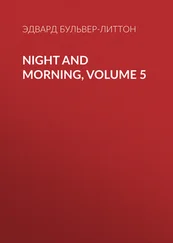Эдвард Бульвер-Литтон - Night and Morning, Complete
Здесь есть возможность читать онлайн «Эдвард Бульвер-Литтон - Night and Morning, Complete» — ознакомительный отрывок электронной книги совершенно бесплатно, а после прочтения отрывка купить полную версию. В некоторых случаях можно слушать аудио, скачать через торрент в формате fb2 и присутствует краткое содержание. Жанр: foreign_prose, literature_19, Европейская старинная литература, foreign_antique, на английском языке. Описание произведения, (предисловие) а так же отзывы посетителей доступны на портале библиотеки ЛибКат.
- Название:Night and Morning, Complete
- Автор:
- Жанр:
- Год:неизвестен
- ISBN:нет данных
- Рейтинг книги:3 / 5. Голосов: 1
-
Избранное:Добавить в избранное
- Отзывы:
-
Ваша оценка:
- 60
- 1
- 2
- 3
- 4
- 5
Night and Morning, Complete: краткое содержание, описание и аннотация
Предлагаем к чтению аннотацию, описание, краткое содержание или предисловие (зависит от того, что написал сам автор книги «Night and Morning, Complete»). Если вы не нашли необходимую информацию о книге — напишите в комментариях, мы постараемся отыскать её.
Night and Morning, Complete — читать онлайн ознакомительный отрывок
Ниже представлен текст книги, разбитый по страницам. Система сохранения места последней прочитанной страницы, позволяет с удобством читать онлайн бесплатно книгу «Night and Morning, Complete», без необходимости каждый раз заново искать на чём Вы остановились. Поставьте закладку, и сможете в любой момент перейти на страницу, на которой закончили чтение.
Интервал:
Закладка:
The physician gathered enough from the appearance of Arthur and the gossip of Mr. Perkins, to conjecture that one of the rich relations he had attributed to Catherine was arrived. Alas! for her it was now indeed too late!
CHAPTER XI
“D’ye stand amazed?—Look o’er thy head, Maximinian!
Look to the terror which overhangs thee.”
Phillip had been five weeks in his new home: in another week, he was to enter on his articles of apprenticeship. With a stern, unbending gloom of manner, he had commenced the duties of his novitiate. He submitted to all that was enjoined him. He seemed to have lost for ever the wild and unruly waywardness that had stamped his boyhood; but he was never seen to smile—he scarcely ever opened his lips. His very soul seemed to have quitted him with its faults; and he performed all the functions of his situation with the quiet listless regularity of a machine. Only when the work was done and the shop closed, instead of joining the family circle in the back parlour, he would stroll out in the dusk of the evening, away from the town, and not return till the hour at which the family retired to rest. Punctual in all he did, he never exceeded that hour. He had heard once a week from his mother; and only on the mornings in which he expected a letter, did he seem restless and agitated. Till the postman entered the shop, he was as pale as death—his hands trembling—his lips compressed. When he read the letter he became composed for Catherine sedulously concealed from her son the state of her health: she wrote cheerfully, besought him to content himself with the state into which he had fallen, and expressed her joy that in his letters he intimated that content; for the poor boy’s letters were not less considerate than her own. On her return from her brother, she had so far silenced or concealed her misgivings as to express satisfaction at the home she had provided for Sidney; and she even held out hopes of some future when, their probation finished and their independence secured, she might reside with her sons alternately. These hopes redoubled Philip’s assiduity, and he saved every shilling of his weekly stipend; and sighed as he thought that in another week his term of apprenticeship would commence, and the stipend cease.
Mr. Plaskwith could not but be pleased on the whole with the diligence of his assistant, but he was chafed and irritated by the sullenness of his manner. As for Mrs. Plaskwith, poor woman! she positively detested the taciturn and moody boy, who never mingled in the jokes of the circle, nor played with the children, nor complimented her, nor added, in short, anything to the sociability of the house. Mr. Plimmins, who had at first sought to condescend, next sought to bully; but the gaunt frame and savage eye of Philip awed the smirk youth, in spite of himself; and he confessed to Mrs. Plaskwith that he should not like to meet “the gipsy,” alone, on a dark night; to which Mrs. Plaskwith replied, as usual, “that Mr. Plimmins always did say the best things in the world!”
One morning, Philip was sent a few miles into the country, to assist in cataloguing some books in the library of Sir Thomas Champerdown—that gentleman, who was a scholar, having requested that some one acquainted with the Greek character might be sent to him, and Philip being the only one in the shop who possessed such knowledge.
It was evening before he returned. Mr. and Mrs. Plaskwith were both in the shop as he entered—in fact, they had been employed in talking him over.
“I can’t abide him!” cried Mrs. Plaskwith. “If you choose to take him for good, I sha’n’t have an easy moment. I’m sure the ‘prentice that cut his master’s throat at Chatham, last week, was just like him.”
“Pshaw! Mrs. P.,” said the bookseller, taking a huge pinch of snuff, as usual, from his waistcoat pocket. “I myself was reserved when I was young; all reflective people are. I may observe, by the by, that it was the case with Napoleon Buonaparte: still, however, I must own he is a disagreeable youth, though he attends to his business.”
“And how fond of money he is!” remarked Mrs. Plaskwith, “he won’t buy himself a new pair of shoes!—quite disgraceful! And did you see what a look he gave Plimmins, when he joked about his indifference to his sole? Plimmins always does say such good things!”
“He is shabby, certainly,” said the bookseller; “but the value of a book does not always depend on the binding.”
“I hope he is honest!” observed Mrs. Plaskwith;—and here Philip entered.
“Hum,” said Mr. Plaskwith; “you have had a long day’s work: but I suppose it will take a week to finish?”
“I am to go again to-morrow morning, sir: two days more will conclude the task.”
“There’s a letter for you,” cried Mrs. Plaskwith; “you owes me for it.”
“A letter!” It was not his mother’s hand—it was a strange writing—he gasped for breath as he broke the seal. It was the letter of the physician.
His mother, then, was ill—dying—wanting, perhaps, the necessaries of life. She would have concealed from him her illness and her poverty. His quick alarm exaggerated the last into utter want;—he uttered a cry that rang through the shop, and rushed to Mr. Plaskwith.
“Sir, sir! my mother is dying! She is poor, poor, perhaps starving;—money, money!—lend me money!—ten pounds!—five!—I will work for you all my life for nothing, but lend me the money!”
“Hoity-toity!” said Mrs. Plaskwith, nudging her husband—“I told you what would come of it: it will be ‘money or life’ next time.”
Philip did not heed or hear this address; but stood immediately before the bookseller, his hands clasped—wild impatience in his eyes. Mr. Plaskwith, somewhat stupefied, remained silent.
“Do you hear me?—are you human?” exclaimed Philip, his emotion revealing at once all the fire of his character. “I tell you my mother is dying; I must go to her! Shall I go empty-handed? Give me money!”
Mr. Plaskwith was not a bad-hearted man; but he was a formal man, and an irritable one. The tone his shopboy (for so he considered Philip) assumed to him, before his own wife too (examples are very dangerous), rather exasperated than moved him.
“That’s not the way to speak to your master:—you forget yourself, young man!”
“Forget!—But, sir, if she has not necessaries—if she is starving?”
“Fudge!” said Plaskwith. “Mr. Morton writes me word that he has provided for your mother! Does he not, Hannah?”
“More fool he, I’m sure, with such a fine family of his own! Don’t look at me in that way, young man; I won’t take it—that I won’t! I declare my blood friz to see you!”
“Will you advance me money?—five pounds—only five pounds, Mr. Plaskwith?”
“Not five shillings! Talk to me in this style!—not the man for it, sir!—highly improper. Come, shut up the shop, and recollect yourself; and, perhaps, when Sir Thomas’s library is done, I may let you go to town. You can’t go to-morrow. All a sham, perhaps; eh, Hannah?”
“Very likely! Consult Plimmins. Better come away now, Mr. P. He looks like a young tiger.”
Mrs. Plaskwith quitted the shop for the parlour. Her husband, putting his hands behind his back, and throwing back his chin, was about to follow her. Philip, who had remained for the last moment mute and white as stone, turned abruptly; and his grief taking rather the tone of rage than supplication, he threw himself before his master, and, laying his hand on his shoulder, said:
“I leave you—do not let it be with a curse. I conjure you, have mercy on me!”
Mr. Plaskwith stopped; and had Philip then taken but a milder tone, all had been well. But, accustomed from childhood to command—all his fierce passions loose within him—despising the very man he thus implored—the boy ruined his own cause. Indignant at the silence of Mr. Plaskwith, and too blinded by his emotions to see that in that silence there was relenting, he suddenly shook the little man with a vehemence that almost overset him, and cried:
Читать дальшеИнтервал:
Закладка:
Похожие книги на «Night and Morning, Complete»
Представляем Вашему вниманию похожие книги на «Night and Morning, Complete» списком для выбора. Мы отобрали схожую по названию и смыслу литературу в надежде предоставить читателям больше вариантов отыскать новые, интересные, ещё непрочитанные произведения.
Обсуждение, отзывы о книге «Night and Morning, Complete» и просто собственные мнения читателей. Оставьте ваши комментарии, напишите, что Вы думаете о произведении, его смысле или главных героях. Укажите что конкретно понравилось, а что нет, и почему Вы так считаете.












